外研版(一年级起点)六年级上册英语Module6-Module10知识点讲解课件(66张)
文档属性
| 名称 | 外研版(一年级起点)六年级上册英语Module6-Module10知识点讲解课件(66张) |  | |
| 格式 | pptx | ||
| 文件大小 | 7.4MB | ||
| 资源类型 | 试卷 | ||
| 版本资源 | 外研版(一年级起点) | ||
| 科目 | 英语 | ||
| 更新时间 | 2021-07-09 16:18:37 | ||
图片预览

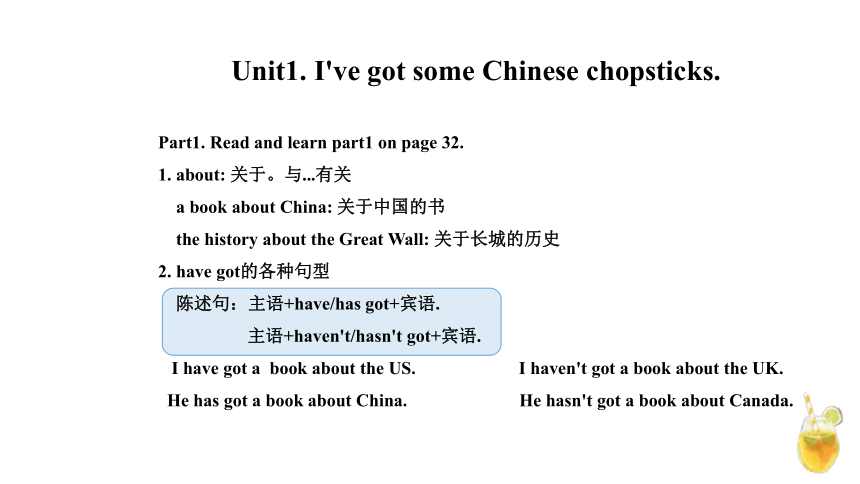
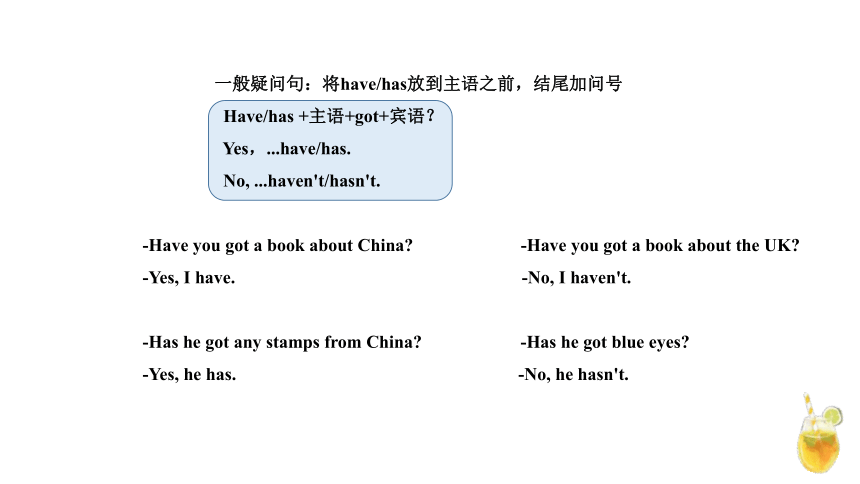
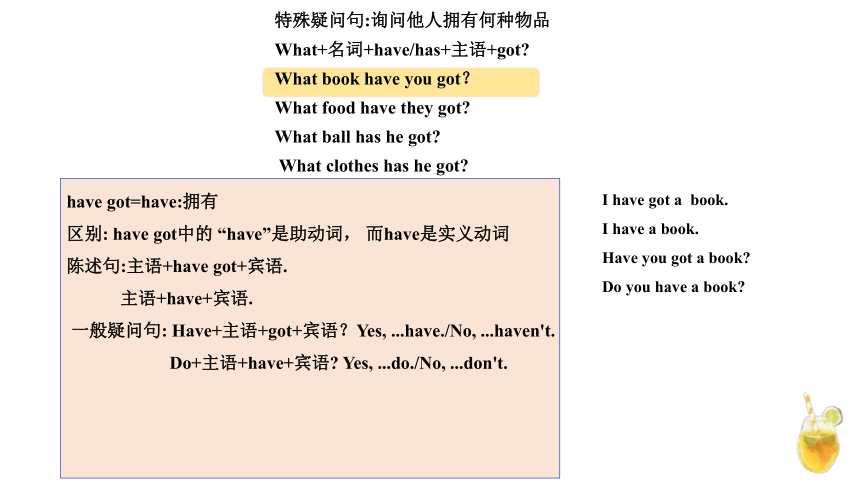
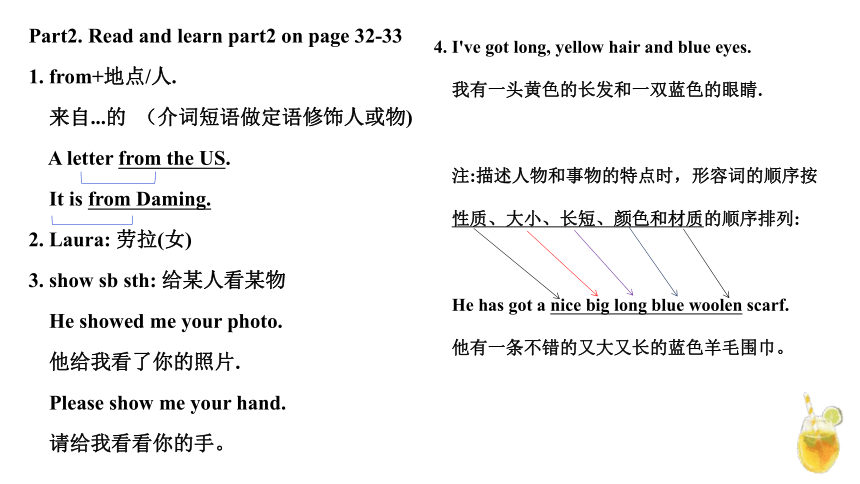
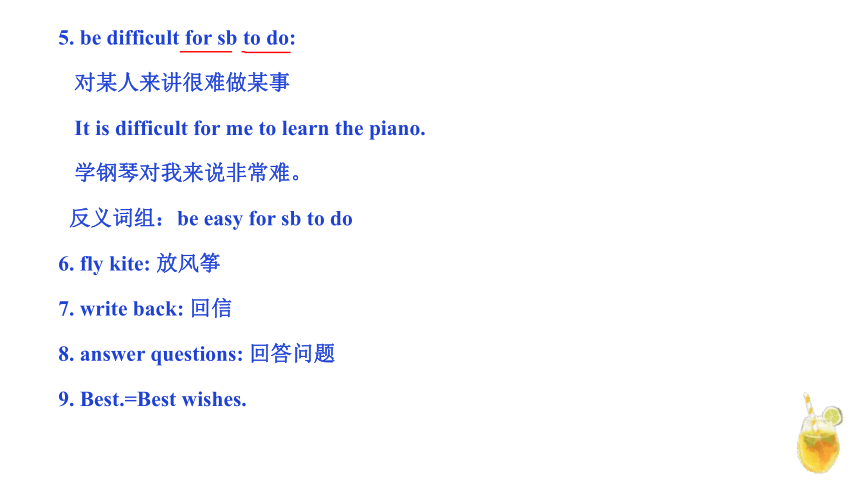
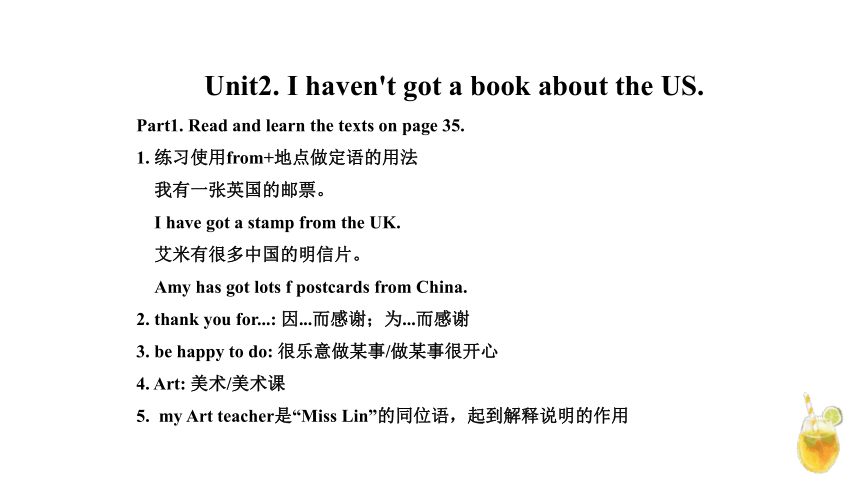
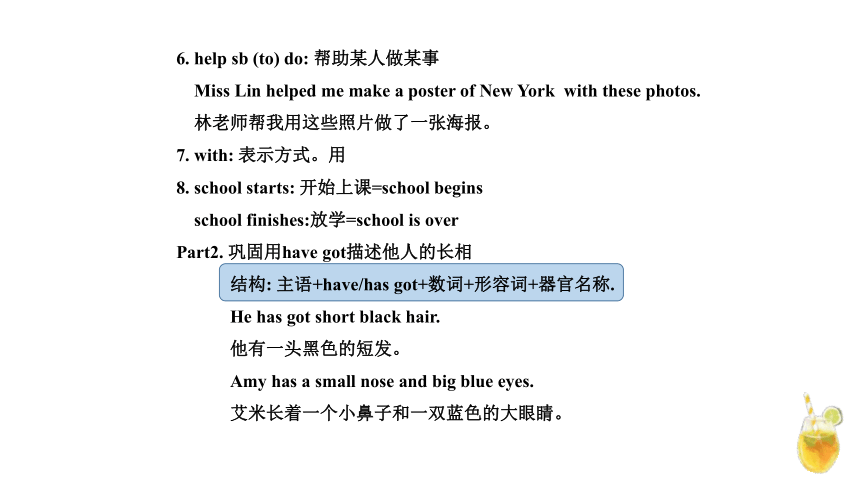
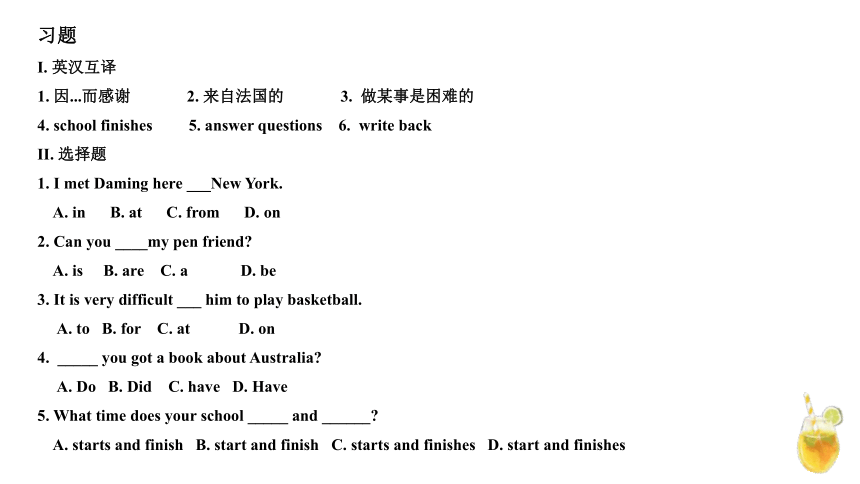
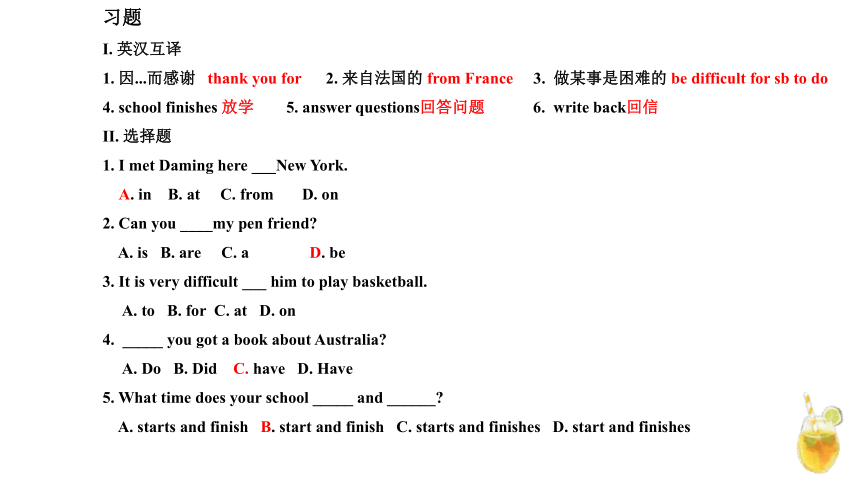


文档简介
Module 6
学习目标
1. 灵活运用have got的各种句式进行表达
2. 熟练运用from+地点的结构表达东西的来源
3. 会介绍自己的情况和拥有的物品
4. 掌握一些单词和词组
Unit1. I've got some Chinese chopsticks.
Part1. Read and learn part1 on page 32.
1. about: 关于。与...有关
a book about China: 关于中国的书
the history about the Great Wall: 关于长城的历史
2. have got的各种句型
陈述句:主语+have/has got+宾语.
主语+haven't/hasn't got+宾语.
I have got a book about the US. I haven't got a book about the UK.
He has got a book about China. He hasn't got a book about Canada.
一般疑问句:将have/has放到主语之前,结尾加问号
Have/has +主语+got+宾语?
Yes,...have/has.
No, ...haven't/hasn't.
-Have you got a book about China? -Have you got a book about the UK?
-Yes, I have. -No, I haven't.
-Has he got any stamps from China? -Has he got blue eyes?
-Yes, he has. -No, he hasn't.
have got=have:拥有
区别: have got中的 “have”是助动词, 而have是实义动词
陈述句:主语+have got+宾语.
主语+have+宾语.
一般疑问句: Have+主语+got+宾语?Yes, ...have./No, ...haven't.
Do+主语+have+宾语? Yes, ...do./No, ...don't.
特殊疑问句:询问他人拥有何种物品
What+名词+have/has+主语+got?
What book have you got?
What food have they got?
What ball has he got?
What clothes has he got?
I have got a book.
I have a book.
Have you got a book?
Do you have a book?
Part2. Read and learn part2 on page 32-33
1. from+地点/人.
来自...的 (介词短语做定语修饰人或物)
A letter from the US.
It is from Daming.
2. Laura: 劳拉(女)
3. show sb sth: 给某人看某物
He showed me your photo.
他给我看了你的照片.
Please show me your hand.
请给我看看你的手。
4. I've got long, yellow hair and blue eyes.
我有一头黄色的长发和一双蓝色的眼睛.
注:描述人物和事物的特点时,形容词的顺序按
性质、大小、长短、颜色和材质的顺序排列:
He has got a nice big long blue woolen scarf.
他有一条不错的又大又长的蓝色羊毛围巾。
5. be difficult for sb to do:
对某人来讲很难做某事
It is difficult for me to learn the piano.
学钢琴对我来说非常难。
反义词组:be easy for sb to do
6. fly kite: 放风筝
7. write back: 回信
8. answer questions: 回答问题
9. Best.=Best wishes.
Unit2. I haven't got a book about the US.
Part1. Read and learn the texts on page 35.
1. 练习使用from+地点做定语的用法
我有一张英国的邮票。
I have got a stamp from the UK.
艾米有很多中国的明信片。
Amy has got lots f postcards from China.
2. thank you for...: 因...而感谢;为...而感谢
3. be happy to do: 很乐意做某事/做某事很开心
4. Art: 美术/美术课
5. my Art teacher是“Miss Lin”的同位语,起到解释说明的作用
6. help sb (to) do: 帮助某人做某事
Miss Lin helped me make a poster of New York with these photos.
林老师帮我用这些照片做了一张海报。
7. with: 表示方式。用
8. school starts: 开始上课=school begins
school finishes:放学=school is over
Part2. 巩固用have got描述他人的长相
结构: 主语+have/has got+数词+形容词+器官名称.
He has got short black hair.
他有一头黑色的短发。
Amy has a small nose and big blue eyes.
艾米长着一个小鼻子和一双蓝色的大眼睛。
习题
I. 英汉互译
1. 因...而感谢 2. 来自法国的 3. 做某事是困难的
4. school finishes 5. answer questions 6. write back
II. 选择题
1. I met Daming here ___New York.
A. in B. at C. from D. on
2. Can you ____my pen friend?
A. is B. are C. a D. be
3. It is very difficult ___ him to play basketball.
A. to B. for C. at D. on
4. _____ you got a book about Australia?
A. Do B. Did C. have D. Have
5. What time does your school _____ and ______?
A. starts and finish B. start and finish C. starts and finishes D. start and finishes
习题
I. 英汉互译
1. 因...而感谢 thank you for 2. 来自法国的 from France 3. 做某事是困难的 be difficult for sb to do
4. school finishes 放学 5. answer questions回答问题 6. write back回信
II. 选择题
1. I met Daming here ___New York.
A. in B. at C. from D. on
2. Can you ____my pen friend?
A. is B. are C. a D. be
3. It is very difficult ___ him to play basketball.
A. to B. for C. at D. on
4. _____ you got a book about Australia?
A. Do B. Did C. have D. Have
5. What time does your school _____ and ______?
A. starts and finish B. start and finish C. starts and finishes D. start and finishes
III. 阅读短文,根据汉语提示用正确的形式写出单词,使短文完整、通顺.
Deart Christmas Father,
My name is Samuel. I am __1__(六)years old. I live in New York. Christmas is coming and I know you are going to visit New York __2___(不久). I am a very good boy this year, so I hope you will _3_(拿来) me lots of presents.
I have four wishes. First, I want a new bicycle because my old one is too _4__(小的) for me now. The second thing I want is a __5___(篮球). You can believe me that I won't play with it in my bedroom. I also want ten _6_ (盒子) of chocolates for Christmas. Don't worry, Father Christmas. I will brush my _7_(牙齿) every day! Finally I hope you will give me many color pencils because I like _8__(绘画).
Will you put them in my Christmas stocking on Christmas Eve? Do you like _9_ (牛奶) and cookies? Shall I put them _10_(在...的下面) the Christmas tree for you?
Love,
Samuel
III. 阅读短文,根据汉语提示用正确的形式写出单词,使短文完整、通顺.
Deart Christmas Father,
My name is Samuel. I am __six__(六)years old. I live in New York. Christmas is coming and I know you are going to visit New York __soon___(不久). I am a very good boy this year, so I hope you will _3_(拿来) me lots of presents.
I have four wishes. First, I want a new bicycle because my old one is too _small__(小的) for me now. The second thing I want is a __basketball___(篮球). You can believe me that I won't play with it in my bedroom. I also want ten _boxes_ (盒子) of chocolates for Christmas. Don't worry, Father Christmas. I will brush my _teeth_(牙齿) every day! Finally I hope you will give me many color pencils because I like _painting__(绘画).
Will you put them in my Christmas stocking on Christmas Eve? Do you like _milk_ (牛奶) and cookies? Shall I put them _under_(在...的下面) the Christmas tree for you?
Love,
Samuel
Module7.
学习目标
1. 会用英语讨论喜欢吃/喝什么
2. 巩固一般现在时
3.会用英语描述人或动物的习性
4. 了解不定冠词a/an的用法
5. 会用介词for描述动作持续的时长
Unit1.Pandas love bamboo.
Part1. Read and learn part1.
1. snake-snakes:蛇
2. 讨论他人是否喜欢某物的句型
提问: Do/Does...like+名词?(可数名词用复数,不可数名词用单数)
回答: Yes, ...do/does.
No, ...don't/doesn't.
-Do you like noodles? -Does he like beer?
-Yes, I do. -Yes, he does.
你喜欢面条吗? 他喜欢啤酒吗?
是的,我喜欢。 是的,他喜欢。
-Do they like eggs? -Does Amy like maths?
-No, they don't. -No, she doesn't.
他们喜欢鸡蛋吗? 艾米喜欢数学吗?
不,他们不喜欢。 不,她不喜欢。
Part2. 练习讨论是否喜欢某物的句型
1. 他喜欢樱桃吗?
是的,他喜欢。
2. 你的妹妹喜欢音乐吗?
不,她不喜欢。
3. 女孩们喜欢娃娃吗?
是的,他们喜欢。
4. 那些孩子喜欢风筝吗?
不,他们 不喜欢。
3. say about: 讲关于
talk about: 谈论关于...
4. bamboo:竹子(c.u.)
5. body: 身体/尸体
6. almost:几乎/差不多
7. deaf: 聋的
mute:哑的
8. frightened: 害怕的
9. 了解What 引导的感叹句
What a great present from simon!
西蒙的礼物真棒!
What +(a/an)+形容词+名词!
What nice beer!
What a sweet gir!
Part3. 巩固一般现在时
1.描述事实
2. 描述习惯性、规律性的动作或状态
动词的形态:
肯定句: 动词原形/动词三单
否定式: don't/doesn't+动词原形
一般疑问句式: Do/Does+主语+动词原形?
特殊疑问句式: 特殊疑问词+do/does+主语+动词原形?
陈述句:
I like noodles.
He loves music.
We don't like PE.
The girl doesn't like sandwhices.
My father goes to work at 8:00 every morning.
My father doesn't go swimming on the weekend.
一般疑问句:
Do you like noodles?
Does he love music?
特殊疑问句:
What do you like?
When does your father go to school every morning?
How do they learn swimming?
Unit 2. A child sleeps for ten hours a night.
Part1. Read and learn the text on page 41.
1. Sh: 嘘
2. roar: 低吼声
3. fox:狐狸
4.掌握for表示动作持续时长的表达方法
结构: 动词+for+时间短语
sleep for two hours
睡两个小时
run for half an hour
跑半个小时
speak for thirty minutes
讲三十分钟
Part2. 用一般现在时描述人或动物的习惯
结构: 主语+动词+地点/时间
A snake sleeps for the whole winter.
A tiger lives in the forest.
Pandas love bamboo.
A baby sleeps for sixteen hours a day.
Bears sleep in winter.
Part3. 了解不定冠词a/an的用法
a/an可用在单数名词前,做为基本情况的概述,无含义
A bear sleeps in winter.
熊在冬天睡觉。
A rabbit has got two long ears.
兔子有一双长耳朵。
An owl sleeps in the day.
猫头鹰在白天睡觉。
练习题
I. 判断下列单词中划线的部分发音是(Y)否(N)相同
1. owl now 2. baby rainy 3. frightened light
4. fantastic can't 5. almost love 6. roar coat
II. 改错题。找出下列句子中错误的地方,将句子改正后写下来
1. Tiger lives in the zoo.
2. The baby sleeps from ten hours.
3. What do it say about my favourite animal?
练习题
I. 判断下列单词中划线的部分发音是(Y)否(N)相同
1. owl now Y 2. baby rainy Y 3. frightened light Y
4. fantastic can't N 5. almost love N 6. roar coat N
II. 改错题。找出下列句子中错误的地方,将句子改正后写下来
Tiger lives in the zoo.(Tiger前加上The)
The tiger lives in the zoo.
The baby sleeps from ten hours. (from改为for)
The baby sleeps for ten hours
3. What do it say about my favourite animal? (do改为does)
What does it say about my favourite animal?
4. What great present from Simon!
5. A fox sleeps in the day and don't sleep at night.
III. 连词成句
1. use, can, its, the, sanke, dance, to, body (.)
2. from, a, what, present, great, Simon (!)
3. love, you, do, hamburgers (?)
4. eat, pandas, twelve, a, hours, day, for (.)
5. sleep, many, a, you, do, how, hours, night (?)
4. What great present from Simon! (great前加上a)
What a great present from Simon!
5. A fox sleeps in the day and don’t sleep at night. (don’t改为doesn’t)
A fox sleeps in the day and doesn’t sleep at night.
III. 连词成句
use, can, its, the, sanke, dance, to, body (.)
The snake can use its body to dance
2. from, a, what, present, great, Simon (!)
What a great present from Simon!
3. love, you, do, hamburgers (?)
Do you love hamburgers?
4. eat, pandas, twelve, a, hours, day, for (.)
Pandas eat twelve hours for a day.
5. sleep, many, a, you, do, how, hours, night (?)
How many hours do you sleep a night.
IV. 阅读短文,根据汉语提示写出单词,使短文完整、通顺
The Millers live in our neighborhood. They __1__(都)work in a zoo. Mrs. Miller looks after Kevin. Kevin is a__2_ (海豚). He is three years old. He is very _3_(聪明的). He can play balls. Kevin likes eating fish. He can eat many_4_ (小的) fishes. Kevin doesn't sleep. He plays or relaxes. But if you want to see his show, please come to __5_ (参观) the zoo from Monday to Saturday. He relaxes on Sunday!
Mr. Miller looks after Larry. Larry is a__6__ (狮子), she is eight years old. She is from Africa. She _7__ (一般地) sleeps and relaxes for twenty ___8__(小时) a day. Larry eats a lot of __9__ (肉)everyday. She has two babies now. They're __10 _ (漂亮的). Larry likes her babies very much.
IV. 阅读短文,根据汉语提示写出单词,使短文完整、通顺
The Millers live in our neighborhood. They __all__(都)work in a zoo. Mrs. Miller looks after Kevin. Kevin is a__dolphin_ (海豚). He is three years old. He is very _clever_(聪明的). He can play balls. Kevin likes eating fish. He can eat many_small_ (小的) fishes. Kevin doesn't sleep. He plays or relaxes. But if you want to see his show, please come to __visit_ (参观) the zoo from Monday to Saturday. He relaxes on Sunday!
Mr. Miller looks after Larry. Larry is a__lion__ (狮子), she is eight years old. She is from Africa. She _usually__ (一般地) sleeps and relaxes for twenty ___hours__(小时) a day. Larry eats a lot of __meat__ (肉)everyday. She has two babies now. They're __beautiful_ (漂亮的). Larry likes her babies very much.
Module 8
学习目标
1. 会用一般现在时讨论他人的生活
2. 会用频率副词表示做事的频率
3. 掌握一些单词和词组的含义及表达
Unit1. Do you often tidy your bed?
Part1. Read and learn the text.
1. tidy-tidied:收拾、整理
2. find-found:发现、找到
3. coin:硬币
4. Let me help you.
让我来帮你。
let....do...: 让...做某事
let him sing
let her run
let us write
5. ever:曾经、究竟
Does he ever tidy his bed?
他到底/究竟收拾他的床吗?
6. sleep well: 睡得好
in bed:在床上
in the/a tree:在树上
7. messy: 乱七八糟的/杂乱的(形容词)
mess:杂乱(名词)
8. read stories: 读故事
read books: 看书
Part2. 巩固用一般现在时讨论他人平时是否做某事
提问: Do/Does....often/always/usually/ever+动词原形?
肯定回答:Yes, ...do/does.
否定回答:No, ...don't/doesn't.
-Do you often read books? -Does Peter usually tidy his room? -Does she ever go to the library?
-Yes, I do. -No, he doesn't. -Yes, she does.
你经常看书吗? 彼得经常打扫他的房间吗? 她平时究竟去图书馆吗?
是的。 不,他不打扫。 她去。
Unit2. I often read English books.
Part1. Read and learn the text.
1. 学习频率副词 (“*”的数量表示频率的高低)
never: 从不 (否定) He never goes to the library.
sometimes:有时候 ** He sometimes goes to the library.
often: 常常*** He often goes to the library
usually: 一般**** He usually goes to the library.
always:总是***** He always goes to the library.
2. 叙述他人常做的事
结构: 主语+频率副词+动词.
I never play football.
我从来不踢足球。
I sometimes clean the blackboard for my teachers.
我有时候为我的老师们擦黑板。
He often reads English book.
他常常看英语书。
Amy always rides her bike to school.
艾米总是骑她的自行车去上学。
习题:
I. 选出下列单词不同类的一项
( )1. A. watches B. plays C. moves D. ride
( )2. A. coin B. tidy C. messy D. pleased
( )3. A. bamboo B. fox C. story D. blackboard
II. 判断下列单词划线的部分发音是否相同
( )1. coin noisy ( )2. blackboard roar ( )3. English interesting
( ) 4. tidy by ( )5. some hot ( )6. never her
习题:
I. 选出下列单词不同类的一项
( )1. A. watches B. plays C. moves D. ride
( )2. A. coin B. tidy C. messy D. pleased
( )3. A. bamboo B. fox C. story D. blackboard
II. 判断下列单词划线的部分发音是否相同
( T )1. coin noisy ( F )2. blackboard roar ( F )3. English interesting
( F ) 4. tidy by ( F )5. some hot ( T )6. never her
III. 英汉互译
1. tidy my room 2. 睡得好 3. very messy 4. 擦黑板 5. read stories
6. by bus 7. 发送邮件 8. watch football games 9. 去图书馆 10. never go
IV. 按要求完成句子
1. Do you often tidy your bed? (做出肯定回答)
2. He never rides his bike to school. (改为一般疑问句)
3. Amy always tidy her desk. (对划线部分提问)
4. well, can, sleep, bed, I, in, tidy (.) (连词成句)
5. Ling ling often reads stories. (改为否定句)
III. 英汉互译
1. tidy my room 整理房间 2. 睡得好 sleep well 3. very messy非常乱
4. 擦黑板 clean the blackboard. 5. read stories读故事 6. by bus 坐公交车
7. 发送邮件send an email 8. watch football games 看足球比赛
9. 去图书馆 go to the library 10. never go从来不去
IV. 按要求完成句子
1. Do you often tidy your bed? (做出肯定回答)
Yes, I do.
2. He never rides his bike to school. (改为一般疑问句)
Does he never ride his bikes to school?
3. Amy always tidy her desk. (对划线部分提问)
What does Amy always do?
4. well, can, sleep, bed, I, in, tidy (.) (连词成句)
I can sleep in tidy bed well.
5. Ling ling often reads stories. (改为否定句)
Ling ling doesn’t often read stories.
V. 阅读短文,从方框中选择合适的词并且用其适当的形式填空。时段文通顺、完整。
有两个词多余。
three, cost, wear, lose, find, choose, take, ride, away, put, ask, minute
January 7 is Benny's birthday. He will be eight years old. He is in the 1.___ grade. He goes to Park Elementary School. It is only one mile 2. ____. He walks to school. It only takes twenty 3. _____. When it rains, he 4. _____ a rain coat. He used to (过去常常) take an umbrella. But he 5. ____ the umbrella.
For his eighth birthday, Benny wants a bicycle so that he can 6. ____ the bike to school. After school his mom and dad 7. ____ him to the bike store. They 8. ____ him to look at the bikes. He looked at all the bikes. He 9. ____ a red bike. He showed it to his parents. Dad said it 10. _____ too much. He told Benny to choose another bike, so Benny chose a blue bike. Dad said the blue bike was the right price.
V. 阅读短文,从方框中选择合适的词并且用其适当的形式填空。时段文通顺、完整。
有两个词多余。
three, cost, wear, lose, find, choose, take, ride, away, put, ask, minute
January 7 is Benny's birthday. He will be eight years old. He is in the 1._third__ grade. He goes to Park Elementary School. It is only one mile 2. _away___. He walks to school. It only takes twenty 3. _minutes____. When it rains, he 4. _wears____ a rain coat. He used to (过去常常) take an umbrella. But he 5. __lost__ the umbrella.
For his eighth birthday, Benny wants a bicycle so that he can 6. _ride___ the bike to school. After school his mom and dad 7. __took__ him to the bike store. They 8. _asked___ him to look at the bikes. He looked at all the bikes. He 9. __chose__ a red bike. He showed it to his parents. Dad said it 10. _cost____ too much. He told Benny to choose another bike, so Benny chose a blue bike. Dad said the blue bike was the right price.
Module 9
学习目标
1.学会讨论自己和他人想要去的地方
2. 掌握一些单词和词组的含义及用法
3.会介绍一些地区的特点
Unit1. Do you want to visit the UN building?
-Do you want to visit China?
-Yes, I do.
你想去中国玩吗?是的,我想。
-Do they want to wash the dishes?
-No, they don't.
他们想洗碗吗?不,他们不想。
-Does your father want to go swimming?
-Yes, he does.
你爸爸想去游泳吗?是的,他想。
-Does Amy want to buy any new CDs?
-No, she doesn't.
艾米想买些新的CD吗?不,她不想。
Part1. Read and learn part1 on page 50.
1. want+to do:想做某事
to do为动词不定式做want的宾语
She wants to go shopping.
Peter wants to buy a new car.
They want to have lunch at school.
2. tweet:叽喳
3. 用一般疑问句询问他人是否想做某事
Do/Does+主语+want to+动词原形?
Yes, ...do/does.
No, ...don't/doesn't.
口语练习
1. 你想参观科技博物馆吗?
是的,我想。
2. 彼得想看一场电影吗?
不, 他不想。
3. 这是我其中的一本故事书。
4. 北京是中国其中一座城市。
5. 我想让我的城市变绿。
Part2. Read and learn part2on page 50.
1.UN building: 联合国总部大楼
UN: United Nations 联合国
2. make peace: 使和平;让...和平
make peace in the world: 让世界和平
3. one of+名词复数: ....其中之一
one of the 193 member states
193个成员国之一
one of my friends: 我朋友中的一个
4. like this:像这样
5. go into: 走进、进入 (强调过程)
Unit2. I want to go to Shanghai.
4. 用特殊疑问句讨论他人想做的事
特殊疑问词+do/does+主语+want to+动词原形?
What do you want to see?
Where do you want to go?
When does he want to watch TV?
Why does Amy want to visit the UN building?
Which kind of cake do they want to buy?
Who does he want to go shopping with?
Part1. Read and learn part1 on page 53.
1. Changjiang River: 长江
=Yangtze River
2. Huangshan Mountain: 黄山
3. fly to: 飞往...
Part2. Read and learn part 2 on page 53
1. to go: 可以去 (不定式做定语修饰places)
2. famous:著名的 (因好事出名)
3. in the south of: 在...的南部
north/west/east
练习:
I. 用所给单词的正确形式填空
1. Does Lily ___ (want) to go skating?
2. Peter and I ___ (not) want to dance.
3. There are many places ___ (go) in China.
4. I think he should ___ (visit) the Great Wall.
5. The UN wants __(make) peace in the world.
II. 按要求写出单词
1. build ___ (名词形式) 2. fly __ (过去式) 3. big ___ (反义词)
4. lake __ (近义词) 5. have got __ (同义词)
练习:
I. 用所给单词的正确形式填空
1. Does Lily _want__ (want) to go skating?
2. Peter and I _don't__ (not) want to dance.
3. There are many places _to go__ (go) in China.
4. I think he should _visit__ (visit) the Great Wall.
5. The UN wants _to make_(make) peace in the world.
II. 按要求写出单词
1. build _building__ (名词形式) 2. fly _flew_ (过去式) 3. big _small__ (反义词)
4. lake _river_ (近义词) 5. have got _have_ (同义词)
III. 连词成句
1. in, this, you, got, haven't, China, building, like (?)
2.the, the, UN, world, to, peace, make, wants, in (.)
3. go, in, to, of, are, lots, there, places, China, beautiful (.)
4. in, China, is, the, Kunming, of, south (.)
5. River, to, do, Changjiang, want, you, visit, the (?)
III. 连词成句
in, this, you, got, haven't, China, building, like (?)
Haven’t you got China building like this?
2.the, the, UN, world, to, peace, make, wants, in (.)
The UN wants to make the world in peace.
3. go, in, to, of, are, lots, there, places, China, beautiful (.)
There are lots of beautiful places to go in China.
4. in, China, is, the, Kunming, of, south (.)
Kunming is in the south of China.
5. River, to, do, Changjiang, want, you, visit, the (?)
Do you want to visit the Changjiang River?
IV. 阅读短文。用所给单词的适当形式填空,使短文完整。
Almost everyone in China 1. ___ (know) Lang Ping. She is the head coach of the Chinese 2. __ (woman) volleyball team. This summer, under her guidance(指导),the team 3. ___ (win) the gold medal at the Rio Olympic Games. Their fighting spirit inspired (鼓舞) people across the country. Lang Ping and the players all became “4. ___ (star)”.
On Spet. 17, Lang Ping 5. ___ (visit) Guangdong Guangya High School and shared her experience with students face to face. Volleyball 6. ___ (play) Xu Yunli and Yuan Xinyue also came. The coach said it was important 7. ___ (set) goals (目标) and try 8. ____ (you) best to realilze (实现) them. Students were all 9. ____ (exciting) . One student even (甚至) drew a picture of Lang Ping and 10. ___ (send) it to her!
IV. 阅读短文。用所给单词的适当形式填空,使短文完整。
Almost everyone in China 1. _knows__ (know) Lang Ping. She is the head coach of the Chinese 2. _women_ (woman) volleyball team. This summer, under her guidance(指导),the team 3. _won__ (win) the gold medal at the Rio Olympic Games. Their fighting spirit inspired (鼓舞) people across the country. Lang Ping and the players all became “4. _star__ (star)”.
On Spet. 17, Lang Ping 5. _visited__ (visit) Guangdong Guangya High School and shared her experience with students face to face. Volleyball 6. _player__ (play) Xu Yunli and Yuan Xinyue also came. The coach said it was important 7. __to set_ (set) goals (目标) and try 8. _your___ (you) best to realilze (实现) them. Students were all 9. __excited__ (exciting) . One student even (甚至) drew a picture of Lang Ping and 10. __sent_ (send) it to her!
Module10
学习目标
1. 学习用It's fun to..描述做事有趣
2. 学会交通用语和描述路线
3. 巩固祈使句
4. 掌握一些单词和词组的用法
5.知道字母O、字母组合oa和ow在单词中的常见发音
Unit1. Only drink clean water!
Part1. Read the text on page 56-57
Part2. Learn the language points.
1. 巩固描述天气的语句
(1). It's+形容词+today. (2). It's +doing today.
It's sunny today. It's raining today.
It's rainy today. It's snowing today.
It's windy today.
It's cloudy today.
It's snowy today.
It's hot/cold today.
2. take away
take...away
把...带走
2. have a picnic:野餐(动)
3. hungry:饥饿的
thirsty:口渴的
4. only:只;仅仅
5. way:方式、方法
6. fun:有趣的、有意思的
It's fun to do...: ...是很有趣的
It's fun to drink this way.
这样喝水很有趣。
It’s fun to play basketball.
打篮球很有趣。
知识点: 形容词+to do 结构
to do 做表语补足语, 补充说明表语的内容
It's easy to wash the dishes.
It's difficult to skate.
It's happy to receive your letter.
Unit 2. Go Straight on
Part1. Read the text on page 59.
Part2. Language points.
1. cross: 穿过、横穿
cross the road: 过马路
cross the river: 渡河(横渡)
2. 与交通有关的常用语
go straight on: 直行
go straight along...: 沿着...直行
straight: 直的/直地
3. turn right: 右转
turn left: 左转
turn right/ left at...:在...右转/左转
Part3. Read and learn the text on page 60.
1. get: 到达
get+to+地点名词
get here/there/home
2. on the right/left:在右边/在左边
on the right/left of...:在...的右边/的左边
The zoo is on the right.
动物园在右边。
The zoo is on the right of the park.
动物园在公园的右边。
3. 用英语探讨路线
提问: How do/does+主语+get to+地点名词?
How do/does+主语+get there/here?
...怎么能到...?
回答: 含有动词短语的祈使句
-How do I get to the zoo?
-Turn right at the supermarket, then go straight on. It's on your left.
我怎么去动物园?
在超市右转,然后直走。动物园在你的左边。
-How does he get there?
- Go straight on and turn left at the third crossing.
他怎么到那里?直走并在第三个路口左转。
Part4. 巩固祈使句的含义
概念:表示请求、要求、命令、劝告、警告、提示等含义
特点: 没有主语或者省略主语
肯定表达: 动词原形开头
否定表达: Don't+动词原形.
Go straight on. Turn right. Stand up!
Don't turn left. Don't sit down.
Part5. 学习字母o和字母组合oa, ow在单词中的发音
1. 字母o在前后都是辅音字母时发单元音/?/
hot got not pot jog
2. 字母O有时在辅音字母后发双元音/??/
so no go
有时发长元音/?:/
do who to
3. 字母组合oa, ow在单词中常发双元音/??/
boat coat road slow grow know
练习:
I. 找出下列单词中划线的部分发音不同的一项
( )1. A. road B. coat C. roar D. goat
( )2. A. pot B. hot C. lot D. do
( )3. A. wow B. low C. know D. grow
II. 用所给单词的适当形式填空
1. I didn't____ (bring) any drinks.
2. Mum, can we have ____ (us) picnic now?
3. How does Peter ____(get) to the zoo?
4. It's fun ____ (learn) English.
5. The light is red. ___(not) cross the road.
练习:
I. 找出下列单词中划线的部分发音不同的一项
( )1. A. road B. coat C. roar D. goat
( )2. A. pot B. hot C. lot D. do
( )3. A. wow B. low C. know D. grow
II. 用所给单词的适当形式填空
1. I didn't__bring__ (bring) any drinks.
2. Mum, can we have _our___ (us) picnic now?
3. How does Peter __get__(get) to the zoo?
4. It's fun ___to learn_ (learn) English.
5. The light is red. __Don’t_(not) cross the road.
III. 英汉互译
1. turn left 2. go straight on 3. 右转 4. 禁止过马路。5. 停!
IV. 将问句和其相应的答语连线
1. What was the weather like? A. No, I don't.
2. How did you go there? B. It was sunny.
3. Where did you go at the weekend. C. Yes, I did.
4. Do you love hamburgers? D. I went to the library.
5. Did you see a friend? E. I went there by train.
III. 英汉互译
turn left 向左转 2. go straight on 直走 3. 右转 turn right
4. 禁止过马路。Don’t cross the road. 5. 停!stop !
IV. 将问句和其相应的答语连线
1. What was the weather like? A. No, I don't.
2. How did you go there? B. It was sunny.
3. Where did you go at the weekend. C. Yes, I did.
4. Do you love hamburgers? D. I went to the library.
5. Did you see a friend? E. I went there by train.
学习目标
1. 灵活运用have got的各种句式进行表达
2. 熟练运用from+地点的结构表达东西的来源
3. 会介绍自己的情况和拥有的物品
4. 掌握一些单词和词组
Unit1. I've got some Chinese chopsticks.
Part1. Read and learn part1 on page 32.
1. about: 关于。与...有关
a book about China: 关于中国的书
the history about the Great Wall: 关于长城的历史
2. have got的各种句型
陈述句:主语+have/has got+宾语.
主语+haven't/hasn't got+宾语.
I have got a book about the US. I haven't got a book about the UK.
He has got a book about China. He hasn't got a book about Canada.
一般疑问句:将have/has放到主语之前,结尾加问号
Have/has +主语+got+宾语?
Yes,...have/has.
No, ...haven't/hasn't.
-Have you got a book about China? -Have you got a book about the UK?
-Yes, I have. -No, I haven't.
-Has he got any stamps from China? -Has he got blue eyes?
-Yes, he has. -No, he hasn't.
have got=have:拥有
区别: have got中的 “have”是助动词, 而have是实义动词
陈述句:主语+have got+宾语.
主语+have+宾语.
一般疑问句: Have+主语+got+宾语?Yes, ...have./No, ...haven't.
Do+主语+have+宾语? Yes, ...do./No, ...don't.
特殊疑问句:询问他人拥有何种物品
What+名词+have/has+主语+got?
What book have you got?
What food have they got?
What ball has he got?
What clothes has he got?
I have got a book.
I have a book.
Have you got a book?
Do you have a book?
Part2. Read and learn part2 on page 32-33
1. from+地点/人.
来自...的 (介词短语做定语修饰人或物)
A letter from the US.
It is from Daming.
2. Laura: 劳拉(女)
3. show sb sth: 给某人看某物
He showed me your photo.
他给我看了你的照片.
Please show me your hand.
请给我看看你的手。
4. I've got long, yellow hair and blue eyes.
我有一头黄色的长发和一双蓝色的眼睛.
注:描述人物和事物的特点时,形容词的顺序按
性质、大小、长短、颜色和材质的顺序排列:
He has got a nice big long blue woolen scarf.
他有一条不错的又大又长的蓝色羊毛围巾。
5. be difficult for sb to do:
对某人来讲很难做某事
It is difficult for me to learn the piano.
学钢琴对我来说非常难。
反义词组:be easy for sb to do
6. fly kite: 放风筝
7. write back: 回信
8. answer questions: 回答问题
9. Best.=Best wishes.
Unit2. I haven't got a book about the US.
Part1. Read and learn the texts on page 35.
1. 练习使用from+地点做定语的用法
我有一张英国的邮票。
I have got a stamp from the UK.
艾米有很多中国的明信片。
Amy has got lots f postcards from China.
2. thank you for...: 因...而感谢;为...而感谢
3. be happy to do: 很乐意做某事/做某事很开心
4. Art: 美术/美术课
5. my Art teacher是“Miss Lin”的同位语,起到解释说明的作用
6. help sb (to) do: 帮助某人做某事
Miss Lin helped me make a poster of New York with these photos.
林老师帮我用这些照片做了一张海报。
7. with: 表示方式。用
8. school starts: 开始上课=school begins
school finishes:放学=school is over
Part2. 巩固用have got描述他人的长相
结构: 主语+have/has got+数词+形容词+器官名称.
He has got short black hair.
他有一头黑色的短发。
Amy has a small nose and big blue eyes.
艾米长着一个小鼻子和一双蓝色的大眼睛。
习题
I. 英汉互译
1. 因...而感谢 2. 来自法国的 3. 做某事是困难的
4. school finishes 5. answer questions 6. write back
II. 选择题
1. I met Daming here ___New York.
A. in B. at C. from D. on
2. Can you ____my pen friend?
A. is B. are C. a D. be
3. It is very difficult ___ him to play basketball.
A. to B. for C. at D. on
4. _____ you got a book about Australia?
A. Do B. Did C. have D. Have
5. What time does your school _____ and ______?
A. starts and finish B. start and finish C. starts and finishes D. start and finishes
习题
I. 英汉互译
1. 因...而感谢 thank you for 2. 来自法国的 from France 3. 做某事是困难的 be difficult for sb to do
4. school finishes 放学 5. answer questions回答问题 6. write back回信
II. 选择题
1. I met Daming here ___New York.
A. in B. at C. from D. on
2. Can you ____my pen friend?
A. is B. are C. a D. be
3. It is very difficult ___ him to play basketball.
A. to B. for C. at D. on
4. _____ you got a book about Australia?
A. Do B. Did C. have D. Have
5. What time does your school _____ and ______?
A. starts and finish B. start and finish C. starts and finishes D. start and finishes
III. 阅读短文,根据汉语提示用正确的形式写出单词,使短文完整、通顺.
Deart Christmas Father,
My name is Samuel. I am __1__(六)years old. I live in New York. Christmas is coming and I know you are going to visit New York __2___(不久). I am a very good boy this year, so I hope you will _3_(拿来) me lots of presents.
I have four wishes. First, I want a new bicycle because my old one is too _4__(小的) for me now. The second thing I want is a __5___(篮球). You can believe me that I won't play with it in my bedroom. I also want ten _6_ (盒子) of chocolates for Christmas. Don't worry, Father Christmas. I will brush my _7_(牙齿) every day! Finally I hope you will give me many color pencils because I like _8__(绘画).
Will you put them in my Christmas stocking on Christmas Eve? Do you like _9_ (牛奶) and cookies? Shall I put them _10_(在...的下面) the Christmas tree for you?
Love,
Samuel
III. 阅读短文,根据汉语提示用正确的形式写出单词,使短文完整、通顺.
Deart Christmas Father,
My name is Samuel. I am __six__(六)years old. I live in New York. Christmas is coming and I know you are going to visit New York __soon___(不久). I am a very good boy this year, so I hope you will _3_(拿来) me lots of presents.
I have four wishes. First, I want a new bicycle because my old one is too _small__(小的) for me now. The second thing I want is a __basketball___(篮球). You can believe me that I won't play with it in my bedroom. I also want ten _boxes_ (盒子) of chocolates for Christmas. Don't worry, Father Christmas. I will brush my _teeth_(牙齿) every day! Finally I hope you will give me many color pencils because I like _painting__(绘画).
Will you put them in my Christmas stocking on Christmas Eve? Do you like _milk_ (牛奶) and cookies? Shall I put them _under_(在...的下面) the Christmas tree for you?
Love,
Samuel
Module7.
学习目标
1. 会用英语讨论喜欢吃/喝什么
2. 巩固一般现在时
3.会用英语描述人或动物的习性
4. 了解不定冠词a/an的用法
5. 会用介词for描述动作持续的时长
Unit1.Pandas love bamboo.
Part1. Read and learn part1.
1. snake-snakes:蛇
2. 讨论他人是否喜欢某物的句型
提问: Do/Does...like+名词?(可数名词用复数,不可数名词用单数)
回答: Yes, ...do/does.
No, ...don't/doesn't.
-Do you like noodles? -Does he like beer?
-Yes, I do. -Yes, he does.
你喜欢面条吗? 他喜欢啤酒吗?
是的,我喜欢。 是的,他喜欢。
-Do they like eggs? -Does Amy like maths?
-No, they don't. -No, she doesn't.
他们喜欢鸡蛋吗? 艾米喜欢数学吗?
不,他们不喜欢。 不,她不喜欢。
Part2. 练习讨论是否喜欢某物的句型
1. 他喜欢樱桃吗?
是的,他喜欢。
2. 你的妹妹喜欢音乐吗?
不,她不喜欢。
3. 女孩们喜欢娃娃吗?
是的,他们喜欢。
4. 那些孩子喜欢风筝吗?
不,他们 不喜欢。
3. say about: 讲关于
talk about: 谈论关于...
4. bamboo:竹子(c.u.)
5. body: 身体/尸体
6. almost:几乎/差不多
7. deaf: 聋的
mute:哑的
8. frightened: 害怕的
9. 了解What 引导的感叹句
What a great present from simon!
西蒙的礼物真棒!
What +(a/an)+形容词+名词!
What nice beer!
What a sweet gir!
Part3. 巩固一般现在时
1.描述事实
2. 描述习惯性、规律性的动作或状态
动词的形态:
肯定句: 动词原形/动词三单
否定式: don't/doesn't+动词原形
一般疑问句式: Do/Does+主语+动词原形?
特殊疑问句式: 特殊疑问词+do/does+主语+动词原形?
陈述句:
I like noodles.
He loves music.
We don't like PE.
The girl doesn't like sandwhices.
My father goes to work at 8:00 every morning.
My father doesn't go swimming on the weekend.
一般疑问句:
Do you like noodles?
Does he love music?
特殊疑问句:
What do you like?
When does your father go to school every morning?
How do they learn swimming?
Unit 2. A child sleeps for ten hours a night.
Part1. Read and learn the text on page 41.
1. Sh: 嘘
2. roar: 低吼声
3. fox:狐狸
4.掌握for表示动作持续时长的表达方法
结构: 动词+for+时间短语
sleep for two hours
睡两个小时
run for half an hour
跑半个小时
speak for thirty minutes
讲三十分钟
Part2. 用一般现在时描述人或动物的习惯
结构: 主语+动词+地点/时间
A snake sleeps for the whole winter.
A tiger lives in the forest.
Pandas love bamboo.
A baby sleeps for sixteen hours a day.
Bears sleep in winter.
Part3. 了解不定冠词a/an的用法
a/an可用在单数名词前,做为基本情况的概述,无含义
A bear sleeps in winter.
熊在冬天睡觉。
A rabbit has got two long ears.
兔子有一双长耳朵。
An owl sleeps in the day.
猫头鹰在白天睡觉。
练习题
I. 判断下列单词中划线的部分发音是(Y)否(N)相同
1. owl now 2. baby rainy 3. frightened light
4. fantastic can't 5. almost love 6. roar coat
II. 改错题。找出下列句子中错误的地方,将句子改正后写下来
1. Tiger lives in the zoo.
2. The baby sleeps from ten hours.
3. What do it say about my favourite animal?
练习题
I. 判断下列单词中划线的部分发音是(Y)否(N)相同
1. owl now Y 2. baby rainy Y 3. frightened light Y
4. fantastic can't N 5. almost love N 6. roar coat N
II. 改错题。找出下列句子中错误的地方,将句子改正后写下来
Tiger lives in the zoo.(Tiger前加上The)
The tiger lives in the zoo.
The baby sleeps from ten hours. (from改为for)
The baby sleeps for ten hours
3. What do it say about my favourite animal? (do改为does)
What does it say about my favourite animal?
4. What great present from Simon!
5. A fox sleeps in the day and don't sleep at night.
III. 连词成句
1. use, can, its, the, sanke, dance, to, body (.)
2. from, a, what, present, great, Simon (!)
3. love, you, do, hamburgers (?)
4. eat, pandas, twelve, a, hours, day, for (.)
5. sleep, many, a, you, do, how, hours, night (?)
4. What great present from Simon! (great前加上a)
What a great present from Simon!
5. A fox sleeps in the day and don’t sleep at night. (don’t改为doesn’t)
A fox sleeps in the day and doesn’t sleep at night.
III. 连词成句
use, can, its, the, sanke, dance, to, body (.)
The snake can use its body to dance
2. from, a, what, present, great, Simon (!)
What a great present from Simon!
3. love, you, do, hamburgers (?)
Do you love hamburgers?
4. eat, pandas, twelve, a, hours, day, for (.)
Pandas eat twelve hours for a day.
5. sleep, many, a, you, do, how, hours, night (?)
How many hours do you sleep a night.
IV. 阅读短文,根据汉语提示写出单词,使短文完整、通顺
The Millers live in our neighborhood. They __1__(都)work in a zoo. Mrs. Miller looks after Kevin. Kevin is a__2_ (海豚). He is three years old. He is very _3_(聪明的). He can play balls. Kevin likes eating fish. He can eat many_4_ (小的) fishes. Kevin doesn't sleep. He plays or relaxes. But if you want to see his show, please come to __5_ (参观) the zoo from Monday to Saturday. He relaxes on Sunday!
Mr. Miller looks after Larry. Larry is a__6__ (狮子), she is eight years old. She is from Africa. She _7__ (一般地) sleeps and relaxes for twenty ___8__(小时) a day. Larry eats a lot of __9__ (肉)everyday. She has two babies now. They're __10 _ (漂亮的). Larry likes her babies very much.
IV. 阅读短文,根据汉语提示写出单词,使短文完整、通顺
The Millers live in our neighborhood. They __all__(都)work in a zoo. Mrs. Miller looks after Kevin. Kevin is a__dolphin_ (海豚). He is three years old. He is very _clever_(聪明的). He can play balls. Kevin likes eating fish. He can eat many_small_ (小的) fishes. Kevin doesn't sleep. He plays or relaxes. But if you want to see his show, please come to __visit_ (参观) the zoo from Monday to Saturday. He relaxes on Sunday!
Mr. Miller looks after Larry. Larry is a__lion__ (狮子), she is eight years old. She is from Africa. She _usually__ (一般地) sleeps and relaxes for twenty ___hours__(小时) a day. Larry eats a lot of __meat__ (肉)everyday. She has two babies now. They're __beautiful_ (漂亮的). Larry likes her babies very much.
Module 8
学习目标
1. 会用一般现在时讨论他人的生活
2. 会用频率副词表示做事的频率
3. 掌握一些单词和词组的含义及表达
Unit1. Do you often tidy your bed?
Part1. Read and learn the text.
1. tidy-tidied:收拾、整理
2. find-found:发现、找到
3. coin:硬币
4. Let me help you.
让我来帮你。
let....do...: 让...做某事
let him sing
let her run
let us write
5. ever:曾经、究竟
Does he ever tidy his bed?
他到底/究竟收拾他的床吗?
6. sleep well: 睡得好
in bed:在床上
in the/a tree:在树上
7. messy: 乱七八糟的/杂乱的(形容词)
mess:杂乱(名词)
8. read stories: 读故事
read books: 看书
Part2. 巩固用一般现在时讨论他人平时是否做某事
提问: Do/Does....often/always/usually/ever+动词原形?
肯定回答:Yes, ...do/does.
否定回答:No, ...don't/doesn't.
-Do you often read books? -Does Peter usually tidy his room? -Does she ever go to the library?
-Yes, I do. -No, he doesn't. -Yes, she does.
你经常看书吗? 彼得经常打扫他的房间吗? 她平时究竟去图书馆吗?
是的。 不,他不打扫。 她去。
Unit2. I often read English books.
Part1. Read and learn the text.
1. 学习频率副词 (“*”的数量表示频率的高低)
never: 从不 (否定) He never goes to the library.
sometimes:有时候 ** He sometimes goes to the library.
often: 常常*** He often goes to the library
usually: 一般**** He usually goes to the library.
always:总是***** He always goes to the library.
2. 叙述他人常做的事
结构: 主语+频率副词+动词.
I never play football.
我从来不踢足球。
I sometimes clean the blackboard for my teachers.
我有时候为我的老师们擦黑板。
He often reads English book.
他常常看英语书。
Amy always rides her bike to school.
艾米总是骑她的自行车去上学。
习题:
I. 选出下列单词不同类的一项
( )1. A. watches B. plays C. moves D. ride
( )2. A. coin B. tidy C. messy D. pleased
( )3. A. bamboo B. fox C. story D. blackboard
II. 判断下列单词划线的部分发音是否相同
( )1. coin noisy ( )2. blackboard roar ( )3. English interesting
( ) 4. tidy by ( )5. some hot ( )6. never her
习题:
I. 选出下列单词不同类的一项
( )1. A. watches B. plays C. moves D. ride
( )2. A. coin B. tidy C. messy D. pleased
( )3. A. bamboo B. fox C. story D. blackboard
II. 判断下列单词划线的部分发音是否相同
( T )1. coin noisy ( F )2. blackboard roar ( F )3. English interesting
( F ) 4. tidy by ( F )5. some hot ( T )6. never her
III. 英汉互译
1. tidy my room 2. 睡得好 3. very messy 4. 擦黑板 5. read stories
6. by bus 7. 发送邮件 8. watch football games 9. 去图书馆 10. never go
IV. 按要求完成句子
1. Do you often tidy your bed? (做出肯定回答)
2. He never rides his bike to school. (改为一般疑问句)
3. Amy always tidy her desk. (对划线部分提问)
4. well, can, sleep, bed, I, in, tidy (.) (连词成句)
5. Ling ling often reads stories. (改为否定句)
III. 英汉互译
1. tidy my room 整理房间 2. 睡得好 sleep well 3. very messy非常乱
4. 擦黑板 clean the blackboard. 5. read stories读故事 6. by bus 坐公交车
7. 发送邮件send an email 8. watch football games 看足球比赛
9. 去图书馆 go to the library 10. never go从来不去
IV. 按要求完成句子
1. Do you often tidy your bed? (做出肯定回答)
Yes, I do.
2. He never rides his bike to school. (改为一般疑问句)
Does he never ride his bikes to school?
3. Amy always tidy her desk. (对划线部分提问)
What does Amy always do?
4. well, can, sleep, bed, I, in, tidy (.) (连词成句)
I can sleep in tidy bed well.
5. Ling ling often reads stories. (改为否定句)
Ling ling doesn’t often read stories.
V. 阅读短文,从方框中选择合适的词并且用其适当的形式填空。时段文通顺、完整。
有两个词多余。
three, cost, wear, lose, find, choose, take, ride, away, put, ask, minute
January 7 is Benny's birthday. He will be eight years old. He is in the 1.___ grade. He goes to Park Elementary School. It is only one mile 2. ____. He walks to school. It only takes twenty 3. _____. When it rains, he 4. _____ a rain coat. He used to (过去常常) take an umbrella. But he 5. ____ the umbrella.
For his eighth birthday, Benny wants a bicycle so that he can 6. ____ the bike to school. After school his mom and dad 7. ____ him to the bike store. They 8. ____ him to look at the bikes. He looked at all the bikes. He 9. ____ a red bike. He showed it to his parents. Dad said it 10. _____ too much. He told Benny to choose another bike, so Benny chose a blue bike. Dad said the blue bike was the right price.
V. 阅读短文,从方框中选择合适的词并且用其适当的形式填空。时段文通顺、完整。
有两个词多余。
three, cost, wear, lose, find, choose, take, ride, away, put, ask, minute
January 7 is Benny's birthday. He will be eight years old. He is in the 1._third__ grade. He goes to Park Elementary School. It is only one mile 2. _away___. He walks to school. It only takes twenty 3. _minutes____. When it rains, he 4. _wears____ a rain coat. He used to (过去常常) take an umbrella. But he 5. __lost__ the umbrella.
For his eighth birthday, Benny wants a bicycle so that he can 6. _ride___ the bike to school. After school his mom and dad 7. __took__ him to the bike store. They 8. _asked___ him to look at the bikes. He looked at all the bikes. He 9. __chose__ a red bike. He showed it to his parents. Dad said it 10. _cost____ too much. He told Benny to choose another bike, so Benny chose a blue bike. Dad said the blue bike was the right price.
Module 9
学习目标
1.学会讨论自己和他人想要去的地方
2. 掌握一些单词和词组的含义及用法
3.会介绍一些地区的特点
Unit1. Do you want to visit the UN building?
-Do you want to visit China?
-Yes, I do.
你想去中国玩吗?是的,我想。
-Do they want to wash the dishes?
-No, they don't.
他们想洗碗吗?不,他们不想。
-Does your father want to go swimming?
-Yes, he does.
你爸爸想去游泳吗?是的,他想。
-Does Amy want to buy any new CDs?
-No, she doesn't.
艾米想买些新的CD吗?不,她不想。
Part1. Read and learn part1 on page 50.
1. want+to do:想做某事
to do为动词不定式做want的宾语
She wants to go shopping.
Peter wants to buy a new car.
They want to have lunch at school.
2. tweet:叽喳
3. 用一般疑问句询问他人是否想做某事
Do/Does+主语+want to+动词原形?
Yes, ...do/does.
No, ...don't/doesn't.
口语练习
1. 你想参观科技博物馆吗?
是的,我想。
2. 彼得想看一场电影吗?
不, 他不想。
3. 这是我其中的一本故事书。
4. 北京是中国其中一座城市。
5. 我想让我的城市变绿。
Part2. Read and learn part2on page 50.
1.UN building: 联合国总部大楼
UN: United Nations 联合国
2. make peace: 使和平;让...和平
make peace in the world: 让世界和平
3. one of+名词复数: ....其中之一
one of the 193 member states
193个成员国之一
one of my friends: 我朋友中的一个
4. like this:像这样
5. go into: 走进、进入 (强调过程)
Unit2. I want to go to Shanghai.
4. 用特殊疑问句讨论他人想做的事
特殊疑问词+do/does+主语+want to+动词原形?
What do you want to see?
Where do you want to go?
When does he want to watch TV?
Why does Amy want to visit the UN building?
Which kind of cake do they want to buy?
Who does he want to go shopping with?
Part1. Read and learn part1 on page 53.
1. Changjiang River: 长江
=Yangtze River
2. Huangshan Mountain: 黄山
3. fly to: 飞往...
Part2. Read and learn part 2 on page 53
1. to go: 可以去 (不定式做定语修饰places)
2. famous:著名的 (因好事出名)
3. in the south of: 在...的南部
north/west/east
练习:
I. 用所给单词的正确形式填空
1. Does Lily ___ (want) to go skating?
2. Peter and I ___ (not) want to dance.
3. There are many places ___ (go) in China.
4. I think he should ___ (visit) the Great Wall.
5. The UN wants __(make) peace in the world.
II. 按要求写出单词
1. build ___ (名词形式) 2. fly __ (过去式) 3. big ___ (反义词)
4. lake __ (近义词) 5. have got __ (同义词)
练习:
I. 用所给单词的正确形式填空
1. Does Lily _want__ (want) to go skating?
2. Peter and I _don't__ (not) want to dance.
3. There are many places _to go__ (go) in China.
4. I think he should _visit__ (visit) the Great Wall.
5. The UN wants _to make_(make) peace in the world.
II. 按要求写出单词
1. build _building__ (名词形式) 2. fly _flew_ (过去式) 3. big _small__ (反义词)
4. lake _river_ (近义词) 5. have got _have_ (同义词)
III. 连词成句
1. in, this, you, got, haven't, China, building, like (?)
2.the, the, UN, world, to, peace, make, wants, in (.)
3. go, in, to, of, are, lots, there, places, China, beautiful (.)
4. in, China, is, the, Kunming, of, south (.)
5. River, to, do, Changjiang, want, you, visit, the (?)
III. 连词成句
in, this, you, got, haven't, China, building, like (?)
Haven’t you got China building like this?
2.the, the, UN, world, to, peace, make, wants, in (.)
The UN wants to make the world in peace.
3. go, in, to, of, are, lots, there, places, China, beautiful (.)
There are lots of beautiful places to go in China.
4. in, China, is, the, Kunming, of, south (.)
Kunming is in the south of China.
5. River, to, do, Changjiang, want, you, visit, the (?)
Do you want to visit the Changjiang River?
IV. 阅读短文。用所给单词的适当形式填空,使短文完整。
Almost everyone in China 1. ___ (know) Lang Ping. She is the head coach of the Chinese 2. __ (woman) volleyball team. This summer, under her guidance(指导),the team 3. ___ (win) the gold medal at the Rio Olympic Games. Their fighting spirit inspired (鼓舞) people across the country. Lang Ping and the players all became “4. ___ (star)”.
On Spet. 17, Lang Ping 5. ___ (visit) Guangdong Guangya High School and shared her experience with students face to face. Volleyball 6. ___ (play) Xu Yunli and Yuan Xinyue also came. The coach said it was important 7. ___ (set) goals (目标) and try 8. ____ (you) best to realilze (实现) them. Students were all 9. ____ (exciting) . One student even (甚至) drew a picture of Lang Ping and 10. ___ (send) it to her!
IV. 阅读短文。用所给单词的适当形式填空,使短文完整。
Almost everyone in China 1. _knows__ (know) Lang Ping. She is the head coach of the Chinese 2. _women_ (woman) volleyball team. This summer, under her guidance(指导),the team 3. _won__ (win) the gold medal at the Rio Olympic Games. Their fighting spirit inspired (鼓舞) people across the country. Lang Ping and the players all became “4. _star__ (star)”.
On Spet. 17, Lang Ping 5. _visited__ (visit) Guangdong Guangya High School and shared her experience with students face to face. Volleyball 6. _player__ (play) Xu Yunli and Yuan Xinyue also came. The coach said it was important 7. __to set_ (set) goals (目标) and try 8. _your___ (you) best to realilze (实现) them. Students were all 9. __excited__ (exciting) . One student even (甚至) drew a picture of Lang Ping and 10. __sent_ (send) it to her!
Module10
学习目标
1. 学习用It's fun to..描述做事有趣
2. 学会交通用语和描述路线
3. 巩固祈使句
4. 掌握一些单词和词组的用法
5.知道字母O、字母组合oa和ow在单词中的常见发音
Unit1. Only drink clean water!
Part1. Read the text on page 56-57
Part2. Learn the language points.
1. 巩固描述天气的语句
(1). It's+形容词+today. (2). It's +doing today.
It's sunny today. It's raining today.
It's rainy today. It's snowing today.
It's windy today.
It's cloudy today.
It's snowy today.
It's hot/cold today.
2. take away
take...away
把...带走
2. have a picnic:野餐(动)
3. hungry:饥饿的
thirsty:口渴的
4. only:只;仅仅
5. way:方式、方法
6. fun:有趣的、有意思的
It's fun to do...: ...是很有趣的
It's fun to drink this way.
这样喝水很有趣。
It’s fun to play basketball.
打篮球很有趣。
知识点: 形容词+to do 结构
to do 做表语补足语, 补充说明表语的内容
It's easy to wash the dishes.
It's difficult to skate.
It's happy to receive your letter.
Unit 2. Go Straight on
Part1. Read the text on page 59.
Part2. Language points.
1. cross: 穿过、横穿
cross the road: 过马路
cross the river: 渡河(横渡)
2. 与交通有关的常用语
go straight on: 直行
go straight along...: 沿着...直行
straight: 直的/直地
3. turn right: 右转
turn left: 左转
turn right/ left at...:在...右转/左转
Part3. Read and learn the text on page 60.
1. get: 到达
get+to+地点名词
get here/there/home
2. on the right/left:在右边/在左边
on the right/left of...:在...的右边/的左边
The zoo is on the right.
动物园在右边。
The zoo is on the right of the park.
动物园在公园的右边。
3. 用英语探讨路线
提问: How do/does+主语+get to+地点名词?
How do/does+主语+get there/here?
...怎么能到...?
回答: 含有动词短语的祈使句
-How do I get to the zoo?
-Turn right at the supermarket, then go straight on. It's on your left.
我怎么去动物园?
在超市右转,然后直走。动物园在你的左边。
-How does he get there?
- Go straight on and turn left at the third crossing.
他怎么到那里?直走并在第三个路口左转。
Part4. 巩固祈使句的含义
概念:表示请求、要求、命令、劝告、警告、提示等含义
特点: 没有主语或者省略主语
肯定表达: 动词原形开头
否定表达: Don't+动词原形.
Go straight on. Turn right. Stand up!
Don't turn left. Don't sit down.
Part5. 学习字母o和字母组合oa, ow在单词中的发音
1. 字母o在前后都是辅音字母时发单元音/?/
hot got not pot jog
2. 字母O有时在辅音字母后发双元音/??/
so no go
有时发长元音/?:/
do who to
3. 字母组合oa, ow在单词中常发双元音/??/
boat coat road slow grow know
练习:
I. 找出下列单词中划线的部分发音不同的一项
( )1. A. road B. coat C. roar D. goat
( )2. A. pot B. hot C. lot D. do
( )3. A. wow B. low C. know D. grow
II. 用所给单词的适当形式填空
1. I didn't____ (bring) any drinks.
2. Mum, can we have ____ (us) picnic now?
3. How does Peter ____(get) to the zoo?
4. It's fun ____ (learn) English.
5. The light is red. ___(not) cross the road.
练习:
I. 找出下列单词中划线的部分发音不同的一项
( )1. A. road B. coat C. roar D. goat
( )2. A. pot B. hot C. lot D. do
( )3. A. wow B. low C. know D. grow
II. 用所给单词的适当形式填空
1. I didn't__bring__ (bring) any drinks.
2. Mum, can we have _our___ (us) picnic now?
3. How does Peter __get__(get) to the zoo?
4. It's fun ___to learn_ (learn) English.
5. The light is red. __Don’t_(not) cross the road.
III. 英汉互译
1. turn left 2. go straight on 3. 右转 4. 禁止过马路。5. 停!
IV. 将问句和其相应的答语连线
1. What was the weather like? A. No, I don't.
2. How did you go there? B. It was sunny.
3. Where did you go at the weekend. C. Yes, I did.
4. Do you love hamburgers? D. I went to the library.
5. Did you see a friend? E. I went there by train.
III. 英汉互译
turn left 向左转 2. go straight on 直走 3. 右转 turn right
4. 禁止过马路。Don’t cross the road. 5. 停!stop !
IV. 将问句和其相应的答语连线
1. What was the weather like? A. No, I don't.
2. How did you go there? B. It was sunny.
3. Where did you go at the weekend. C. Yes, I did.
4. Do you love hamburgers? D. I went to the library.
5. Did you see a friend? E. I went there by train.
同课章节目录
- Module 1
- Unit 1 How long is the Great Wall?
- Unit 2 It's more than four hundred metres high!
- Module 2
- Unit 1 I went to Chinatown in New York yesterday.
- Unit 2 I went to a library yesterday.
- Module 3
- Unit 1 Have you got any stamps from China?
- Unit 2 Collecting stamps is my hobby.
- Module 4
- Unit 1 Thanksgiving is very important in the US.
- Unit 2 Can you tell me aboutChristmas??
- Module 5
- Unit 1 Can I write to her?
- Unit 2 I want a Chinese pen friend.
- Module 6
- Unit 1 I've got some Chinese chopsticks.
- Unit 2 I haven't got a book aboutthe US.
- Module 7
- Unit 1 Pandas love bamboo.
- Unit 2 A child sleeps for eight hours a night.
- Module 8
- Unit 1 Do you often tidy your bed?
- Unit 2 I often read English books.
- Module 9
- Unit 1 Do you want to visit the UN building?
- Unit 2 I want to go to Shanghai.
- Module 10
- Unit 1 Only drink clean water!
- Unit 2 Go straight on.
- Review Module
- Unit 1
- Unit 2
